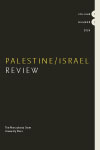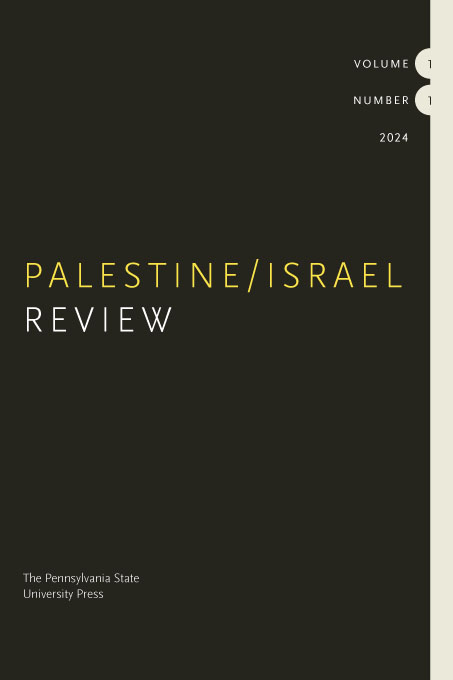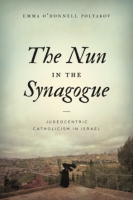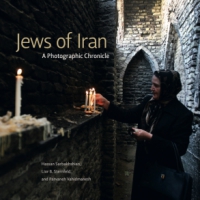Palestine/Israel Review
Sonia Boulos, Editor
Atalia Omer, Editor
- Description
- Board
- Submissions
- Indexing

Access online through the Scholarly Publishing Collective. Click the "Advance Publication" option for newest content.
Palestine/Israel Review is an open access journal that provides a platform for exchanging knowledge, scholarship, and ideas among scholars who share the relational, integrative, and holistic approach to the study of Palestine/Israel.
In approaching Palestine/Israel, the journal is committed to the following basic principles of international law:
1. The international Court of Justice has pronounced that Israel’s occupation of the West Bank, including East Jerusalem, and the Gaza Strip is a wrongful act of a continuing character, which violate the prohibition on the acquisition of territory by force and the right to self-determination of the Palestinian people. Therefore, Israel is under the obligation to bring an end to its illegal presence in the Occupied Palestinian Territory as rapidly as possible, including the obligation to dismantle settlements and the segregation wall.
2. International law also considers the Syrian Golan Heights as occupied by Israel, the colonization of which must end too. International law requires granting Palestinian citizens of Israel full equality, both on an individual level and as an indigenous group.
3. The right of Palestinian refugees to return to their homes and properties as stipulated in UN resolution 194 is an imperative of core international law norms.
The journal publishes studies in the humanities and the social sciences that emphasize the social, cultural, economic, and political dynamics between the Arab and Jewish communities in Palestine/Israel from the nineteenth century until the present. The journal will cover these dynamics in Palestine/Israel (from Ottoman times to the present). Topics of interest will include related processes in the region (for example, among Palestinian refugees in neighboring countries), as well as relevant developments overseas (for example, the place of Jewish communities abroad in the Israeli-Palestinian conflict).
Authors hold copyright to their articles and PSU Press licenses the work under Creative Commons Attribution CC-BY-NC-ND. The Palestine/Israel Review is an open access journal, which means that all content is freely available immediately upon publication without charge to the user or their institution. Users can read, download, copy, distribute, print, search, or link to the full texts of the articles, per the terms of the CC-BY-NC-ND license, without asking prior permission from the publisher or the author.
Palestine/Israel Review is made available Open Access with generous support from the Department of History at Penn State University.
There is no fee associated with submitting or publishing an article in the journal.
Call for Submissions for a special issue: From Nakba to Genocide, guest edited by Dr. Maha Nassar and Dr. Raz Segal. Please see the Submissions tab for details.
Editors
Sonia Boulos
Atalia Omer
Associate Editor
Lior Sternfeld
Book Review Editor
Ian Lustick
Editorial Board
Joel Beinin
Anna Bernard
Leila Farsakh
Honaida Ghanim
Nadeem Karkabi
Amnon Raz-Krakotzkin
Laura Robson
Ella Shohat
Tamir Sorek
Oren Yiftachel
Raef Zreik
Advisory Board
Bashir Bashir
Basilius Bawardi
Arie Dubnov
Awad Halabi
Liora Halperin
Shai Hazkani
Amal Jamal
Daniel Monterescu
Mohanad Mustafa
Issam Nassar
Randa Serhan
Avi Shoshana
Ran Zwigenberg
Call for Submissions
For a special issue, “From Nakba to Genocide,” in Palestine/Israel Review, guest edited by Dr. Maha Nassar and Dr. Raz Segal
With news of a ceasefire agreement, Israel’s 15-month-long genocide in Gaza warrants greater scrutiny. Official UN figures put the number of Palestinians that Israel has killed so far above 46,000. The actual number is likely far higher—a recent article in The Lancet argues that Israel had killed over 64,000 Palestinians by the end of June 2024, and 99 doctors and other healthcare workers who have worked in Gaza since October 2023 wrote in a letter to US President Biden in October 2024 that Israel may have killed over 120,000 Palestinians. Israeli attacks have also injured more than 110,000 people and have forcibly displaced multiple times nearly all 2.3 million Palestinians in the Gaza Strip. Even if the ceasefire leads to the end of Israel’s genocide, Palestinians in Gaza will continue to die as a result of the atrocious conditions that Israel has intentionally created, including starvation policies, and the unprecedented destruction means that it will take decades to remove the rubble and rebuild.
Israel has crossed all red lines in its genocidal assault on Gaza: it has killed over 16,000 children; destroyed most of the hospitals; demolished all the universities and most of the schools. More journalists, aid workers, and health care personnel have been killed than in any other war or state violence in the 21st century. All this is supported by explicit Israeli political, media, and social discourses that celebrate genocide, as evidenced by the thousands of mass atrocity videos that Israeli soldiers and officers in Gaza have proudly uploaded to social media.
This livestreamed genocide has not led most Western states, primarily the US, to reconsider their unconditional military and diplomatic support for Israel. Yet people around the world have responded to this Israeli-Western genocide through mass demonstrations, hundreds of pro-Palestine campus encampments, and a significant increase in BDS initiatives. It is no accident that a Global South state, South Africa, brought the charge of genocide against Israel in the International Court of Justice (ICJ) in December 2023, and the International Criminal Court (ICC) finally issued arrest warrants in November 2024 against Israeli Prime Minister Benjamin Netanyahu and former Defense Minister Yoav Gallant.
The Palestine/Israel Review’s special issue, “From Nakba to Genocide,” planned for late 2025 or early 2026, will include research articles (6,000-7,000 words), shorter reflection pieces (approx. 3,000 words, which may include discussions of visual art or other creative works), and poetry. It will address the incessantly accumulating evidence for Israel’s “genocide as colonial erasure,” situating it within the broader history of the 1948 Nakba and the 76-year-old ongoing Nakba of Israeli settler-colonial violence against Palestinians. This includes Israel’s military regime over Palestinian citizens until 1966; the Israeli military occupation of the West Bank, East Jerusalem, and Gaza Strip after 1967; the systematic “unchilding” of Palestinian children; the mass imprisonment and torture of Palestinians; the system of apartheid; and the 17-year-long siege on the Gaza Strip—the longest in modern history.
We seek articles that engage with international law, the legal struggle to stop Israel’s genocide in Gaza, and the urgency of genocide prevention in relation to the escalating Israeli settler-colonial violence in the West Bank, East Jerusalem, and against Palestinian citizens of Israel. Other topics we seek to address include: Nakba and genocide denial; firsthand accounts by Palestinians; resistance against Israeli settler colonialism (including through international solidarity efforts); and sumud, including the persistence of Palestinian artistic expression and education in Palestine and beyond in the face of unprecedented cultural destruction and scholasticide. We are particularly interested in articles and poems that center the voices, knowledge, and perspectives of Palestinians. Inspired by Palestinian physician and poet Fady Joudah’s argument that “Palestine will be liberated in Arabic,” the co-editors of the volume will publish some of the articles and poems in both English and Arabic.
Please send abstracts (approx. 350 words) and short bios (approx. 200 words) for research articles and reflections pieces or drafts of poems in Arabic, English, or other languages (including translated pieces) to the co-editors of the special issue: Dr. Maha Nassar and Dr. Raz Segal .
Abstracts, drafts of poems, and bios due: 28 February 2025
Submission of articles and complete poems due: 15 May 2025 on the journal submission site http://www.editorialmanager.com/pir/. The online system will guide you through the steps to upload your article to the editorial office.
For initial consideration, authors may submit their paper in any scholarly format or layout. There are no strict formatting requirements, but all manuscripts must contain the essential elements needed to evaluate a manuscript: abstract, keywords, figures, tables, references. References can be in any style or format, so long as a consistent scholarly citation format is applied. For final post-acceptance submissions, the Chicago Manual of Style, 18th edition, should be applied.
Manuscript length might vary by discipline, but the journal will not publish peer-reviewed scholarly papers longer than 10,000 words. The journal will also consider shorter position papers, no longer than 3,000 words.
In addition, the journal invites proposals for peer-reviewed extended book reviews, discussing three to six recent titles in the field of Palestine/Israel, preferably in more than one language. For submitting a proposal, please , mentioning which books you would like to review, as well as your estimated timeline for submitting the review.
To submit a manuscript to Palestine/Israel Review, or a proposal for a book review, please visit http://www.editorialmanager.com/pir/. The online system will guide you through the steps to upload your article to the editorial office. Refer to these submission guidelines before uploading your manuscript.
Index to Jewish Periodicals
Also of Interest
Mailing List
Subscribe to our mailing list and be notified about new titles, journals and catalogs.






